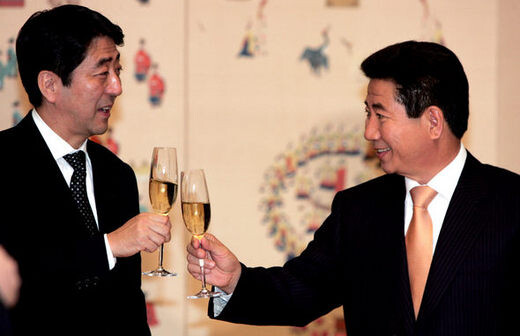hankyoreh
Links to other country sites 다른 나라 사이트 링크
Japan’s PM says women ‘not forced’ into sexual servitude

Japanese Prime Minister Shinzo Abe said March 1 that the Japanese government never forced women in Asia to be "comfort women," or sex slaves, for the Japanese military during World War II.
His statement is expected to enrage countries neighboring Japan, especially China and Korea, which have long taken the Japanese government to task for its past aggression. The comments also come at a time when the United States House of Representatives is scheduled to vote on a resolution that would call on Japan to "formally and unambiguously apologize for and acknowledge the tragedy that comfort women endured at the hands of its Imperial Army."
Abe did not deny the existence of comfort women, sent to the front lines to serve as prostitutes for Japanese troops, but did state that the 200,000 women were not forced into the situation by the Japanese military or any other Japanese government entity.
"There is no evidence to support the claim there was coercion," Abe said.
U.S. congressman and Japanese-American Mike Honda on March 2 rebutted Abe’s statements, saying there was "overwhelming historical record" proving the existence of sexual slavery under World War II Japan and adding that an official apology from Tokyo would "increase Japan’s standing as a member of the community of free, democratic nations."
The Sankei Shimbun reported that some of the same parliamentarians plan to travel to Washington D.C. next month and meet with U.S. House of Representatives member Mike Honda, author of the House resolution calling for Japan to admit to and apologize over the comfort women issue. The parliamentarians plan to convey their position to Honda and other House members who support the bill. The Sankei Shimbun article, which ran the day before Abe’s comments, said that Japanese diplomatic officials in Washington believe the issue is of little interest in the U.S.
Though considered insufficient efforts by many, especially former comfort women, two Japanese government officials have issued statements at least admitting that women were forced into sexual slavery by the Japanese Imperial Army. The first was by then Chief Cabinet Secretary Yohei Kono in 1993, and in 1995, then Prime Minister Tomiichi Murayama also admitted official involvement. Both statements came after a Japanese academic discovered official documentation from the war period in the Japanese military’s archives outlining its program for establishing brothels for its soldiers. Right-wing critics, particularly of Murayama, who was a left-wing socialist, have noted that the records only indicate official involvement by the military and not that the women were forced to participate.
In addition, the government set up a reparations fund for the women, but it is funded by private organizations rather than the government, which has also invited criticism as a means for Tokyo to own up to its actions. The official government position had long been that "private enterprise" had operated the network of comfort women, and to date the Japanese parliament has never admitted or apologized for any past atrocities. Upon entering office, Abe said he "accepted" the statements made by Kono and Murayama, but until Thursday had avoided making further comments on his country’s wartime past.
Just this week, right-wing members of the Japanese parliament called for a "revision" of the statement issued by Kono in 1993. In a formal proposal to Abe’s government, they said there "may have been coercion by private businessmen" allegedly supplying the brothels with women, but "there was no coercion on the part of the military or government agency," according to the Yomiuri Shimbun. "Where there’s demand, businesses crop up," said Nariaki Nakayama, the leader of the right-wing group of parliament members, as quoted by The New York Times. The members also said that "Kono’s statement hurt Japan’s image and is inviting criticism of Japan that is full of misconception and ill will."
Please direct questions or comments to [englishhani@hani.co.kr]
Editorial・opinion
![[Editorial] Does Yoon think the Korean public is wrong? [Editorial] Does Yoon think the Korean public is wrong?](https://flexible.img.hani.co.kr/flexible/normal/500/300/imgdb/original/2024/0417/8517133419684774.jpg) [Editorial] Does Yoon think the Korean public is wrong?
[Editorial] Does Yoon think the Korean public is wrong?![[Editorial] As it bolsters its alliance with US, Japan must be accountable for past [Editorial] As it bolsters its alliance with US, Japan must be accountable for past](https://flexible.img.hani.co.kr/flexible/normal/500/300/imgdb/original/2024/0417/6817133413968321.jpg) [Editorial] As it bolsters its alliance with US, Japan must be accountable for past
[Editorial] As it bolsters its alliance with US, Japan must be accountable for past- [Guest essay] Amending the Constitution is Yoon’s key to leaving office in public’s good graces
- [Editorial] 10 years on, lessons of Sewol tragedy must never be forgotten
- [Column] A death blow to Korea’s prosecutor politics
- [Correspondent’s column] The US and the end of Japanese pacifism
- [Guest essay] How Korea turned its trainee doctors into monsters
- [Guest essay] As someone who helped forge Seoul-Moscow ties, their status today troubles me
- [Editorial] Koreans sent a loud and clear message to Yoon
- [Column] In Korea’s midterm elections, it’s time for accountability
Most viewed articles
- 1[Column] The clock is ticking for Korea’s first lady
- 2[Editorial] When the choice is kids or career, Korea will never overcome birth rate woes
- 3[Guest essay] How Korea turned its trainee doctors into monsters
- 4[Editorial] As it bolsters its alliance with US, Japan must be accountable for past
- 5S. Korea, Japan reaffirm commitment to strengthening trilateral ties with US
- 6Korea, Japan jointly vow response to FX volatility as currencies tumble
- 7Gangnam murderer says he killed “because women have always ignored me”
- 8Japan officially says compensation of Korean forced laborers isn’t its responsibility
- 9[News analysis] After elections, prosecutorial reform will likely make legislative agenda
- 10‘Right direction’: After judgment day from voters, Yoon shrugs off calls for change